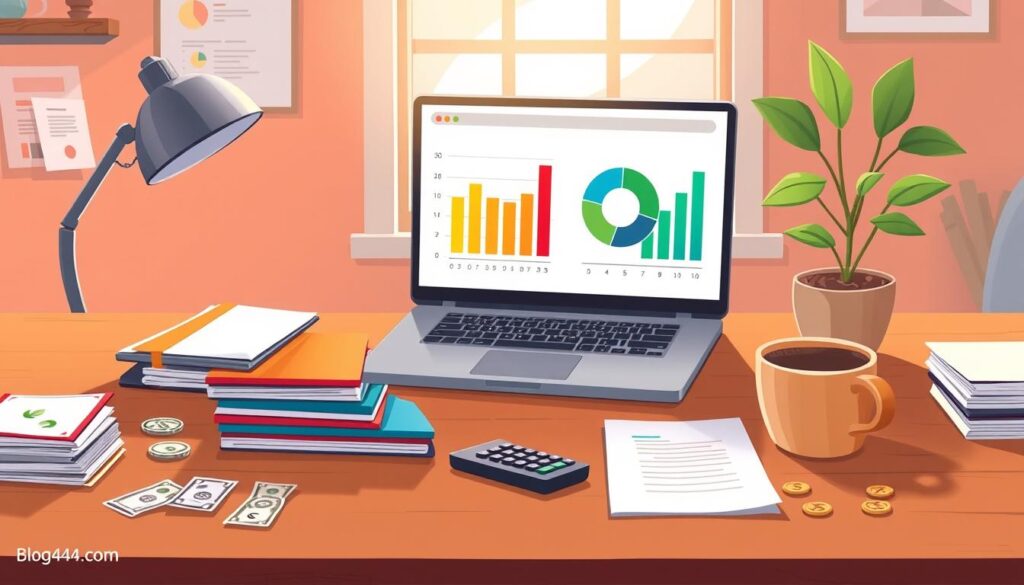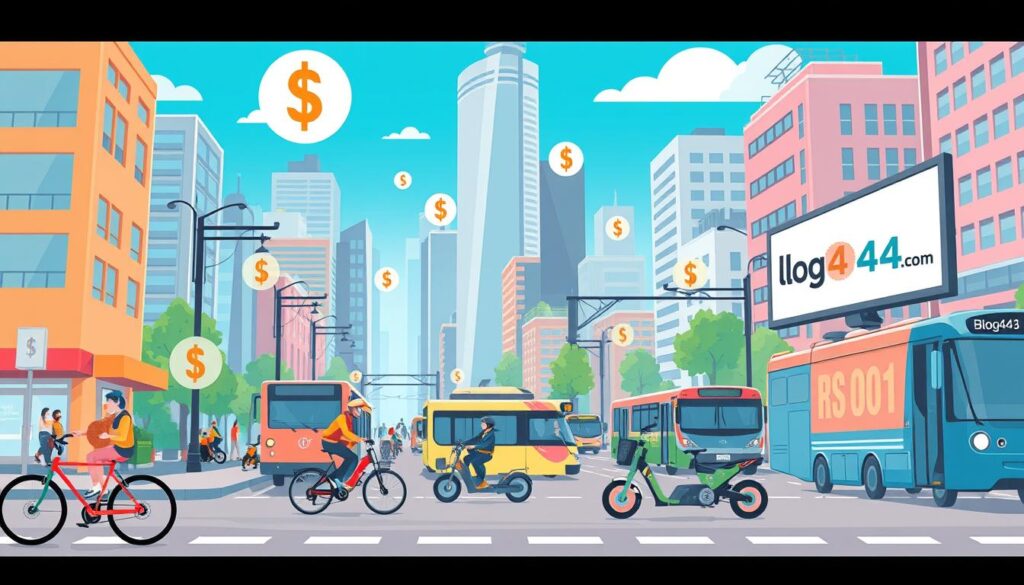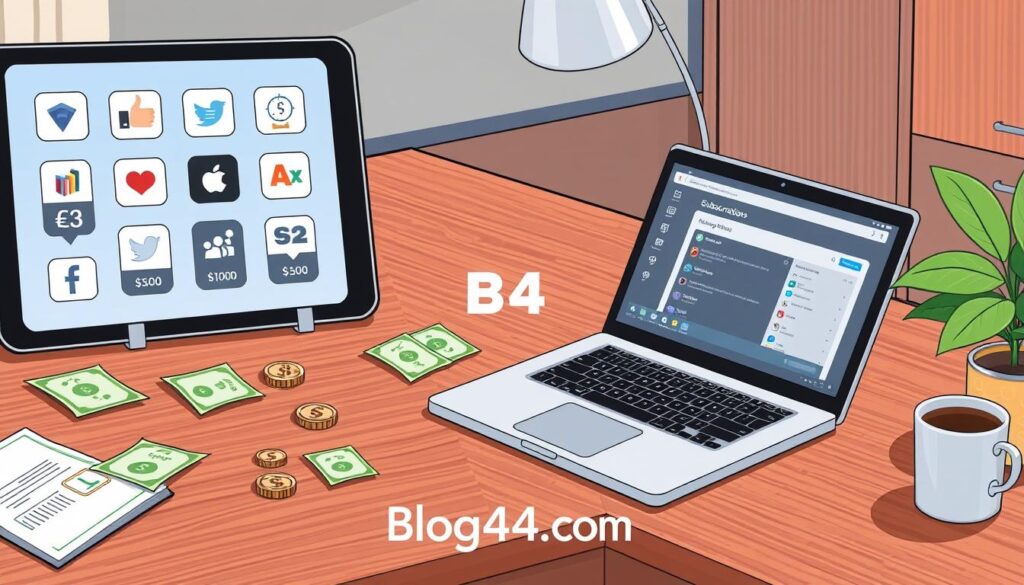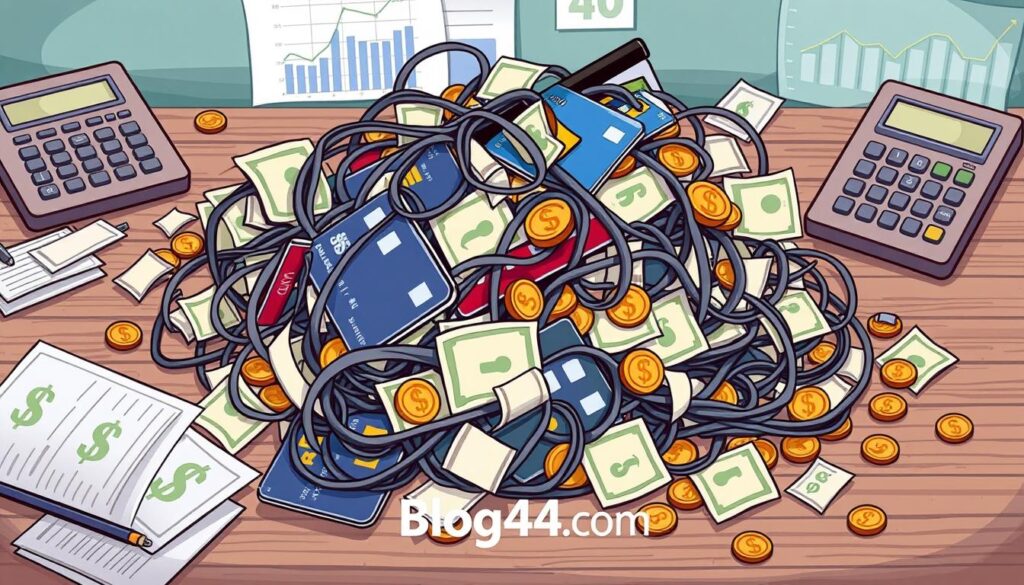Are you finding it hard to make ends meet lately? Do you want to save more but feel like you’re always short on cash? You’re not alone. Today, over a third of Americans can’t cover a $400 emergency, and nearly half don’t have three months’ expenses saved. But, there are smart ways to start saving quickly and build lasting financial habits.
In this guide, we’ll cover many smart money-saving tips. You’ll learn how to cut down on unnecessary spending, find side hustles, and use high-yield accounts. By the end, you’ll know how to take charge of your finances and reach your savings goals in 2024 and beyond.
Key Takeaways
- Develop a strategic budget to identify and eliminate unnecessary expenses.
- Leverage high-yield savings accounts to maximize your returns on savings.
- Explore side hustles and passive income streams to boost your savings.
- Automate your savings to ensure consistent contributions and minimize temptation.
- Prioritize long-term financial goals and create a plan to achieve them.
Understanding Today’s Financial Landscape
In 2024, we face economic challenges, inflation, and post-pandemic trends. These factors shape our financial decisions and strategies. They help us achieve financial security.
Current Economic Challenges
The pandemic’s effects and global market changes have made our economy complex. 56% of Americans can’t cover a $1,000 emergency expense from savings. This shows many people are financially vulnerable.
Impact of Inflation on Savings
Inflation reduces our money’s value. In 2024, 401(k) plans allow up to $23,000 or $30,500 for those 50+ to save before taxes. This highlights the need to save more to fight inflation.
Post-Pandemic Savings Trends
The pandemic changed how we view money. 52% of Americans say money affects their mental health. Saving regularly can help manage financial stress and bring stability.
| Statistic | Value |
|---|---|
| Americans who can’t cover a $400 unexpected expense | 37% |
| Record high of American household debt | $17.69 trillion |
| Range of interest rates on credit cards | 13% to 27% |
| Average household income before taxes | $74,580 |
Understanding today’s financial scene helps us tackle challenges and seize opportunities. By focusing on financial planning, personal finance, and cost savings, we can secure our financial future.
Creating a Solid Budget Strategy
Effective budget planning is key to managing money well. Start by examining your spending with budget apps, bank statements, or other tools. This will show you where to cut costs and save more.
Make saving a regular part of your budget, like paying bills. Decide when it’s okay to use your savings. Aim for an emergency fund that covers three to six months of living costs.
The 50/30/20 budget rule is a good starting point. It suggests using 50% for bills, 20% for savings, and 30% for fun. This balance helps you stay financially stable and reach your goals.
“Building a budget can help reveal spending habits, allowing for adjustments in financial goals.”
If you want to save more, the FI (Financial Independence) community saves 50% of their income. This shows a strong commitment to wealth and early financial freedom.
Tools like YNAB, Mint, and EveryDollar help track expenses and manage money. They are great for keeping your budget planning, expense tracking, and money management on track.

Essential Grocery Shopping Tactics to Save Money
Savvy grocery shopping is a great way to cut costs and live more frugally. By using smart shopping strategies, you can make your money go further. This means spending less on food than you need to.
Smart Shopping Lists and Meal Planning
Start by making a detailed shopping list for the week. This is based on your meal plan. It helps you avoid buying things on impulse and only get what you really need.
Meal planning also cuts down on food waste. You’re less likely to let food go bad in your fridge.
Generic vs. Brand Name Products
When you can choose, pick generic or store-brand items over name-brand ones. Often, the quality is just as good, but they cost less. Making this switch can save you a lot of money over time.
Bulk Buying Benefits
- Look for chances to buy in bulk, especially for things that don’t spoil fast. Buying in bulk can save you money because the cost per unit is lower. It’s a smart way to live more frugally.
- But remember, buying in bulk means spending more upfront and needing more space to store things. Make sure you can use up the bigger amounts before they go bad.
Using these cost-cutting tips can help you get the most out of your grocery budget. Stay alert, plan ahead, and enjoy the perks of smart shopping.
Housing Costs Optimization
Reducing your housing costs can greatly help with cost-cutting strategies and expense reduction. Look into ways to lower your housing costs, like negotiating rent or refinancing your mortgage. Also, consider living with others to cut down on expenses.
Investing in energy-efficient home upgrades can also save you money. Simple changes like weatherproofing, energy-saving appliances, and smart home tech can help a lot. These upgrades can make a big difference in your monthly budget.
Financing Home Improvements
There are many ways to finance home improvements. Home equity loans or HELOCs often have lower interest rates. Personal loans offer fixed APRs without needing collateral. Credit cards are good for small repairs but have higher interest rates.
The right financing choice depends on your needs and project details. Always compare offers from contractors. They might have financing options that are better for you.

Optimizing your housing costs requires some work, but the benefits are worth it. By trying these strategies, you’ll improve your financial flexibility and security.
Smart Energy Management for Lower Bills
As living costs keep going up, managing your energy use is key for saving money. Smart energy-saving tips can cut your utility bills and lower your expenses.
Home Insulation Tips
Insulating your home well is a top way to save energy. Make sure your walls, attic, and other spots are well-insulated. This stops heat from escaping in winter and cool air from leaking in summer. It can save you a lot on heating and cooling bills.
Energy-Efficient Appliances
When it’s time to get new appliances, choose energy-efficient ones with the ENERGY STAR label. These use less power, which means lower bills over time. Think about getting new fridges, washers, dryers, and other big appliances for these savings.
Daily Energy-Saving Habits
- Unplug unused electronics and appliances to stop phantom power drain.
- Use energy-saving LED light bulbs in your home.
- Keep your thermostat at a good temperature to avoid wasting energy.
- Do full loads of laundry and dishes to use less water and energy.
- Turn off lights and gadgets when you’re not using them.
Adopting these easy energy-saving habits can really cut your utility costs. A mix of good insulation, energy-saving appliances, and smart habits can lead to big savings. This way, you can live more frugally and sustainably.
Transportation Cost Reduction Strategies
Managing transportation costs can be tough, but smart strategies can help. Consider carpooling, public transit, or biking for short trips. These options save fuel, are good for the planet, and boost your health.
If you drive a car, keeping it in good shape is key. Regular maintenance boosts fuel efficiency and avoids expensive repairs. Also, look for the best insurance deals and discounts to save money.
Businesses can find creative ways to cut transportation costs. Route optimization software and fuel economy systems can cut fuel usage by up to 31% for modern trucks, while automated warehouses and cross-docking facilities improve efficiency and lower costs. Working with third-party logistics (3PL) providers can also save money by streamlining logistics.
For companies that ship products, optimizing less-than-truckload (LTL) shipping can be a big win. Renegotiating with carriers, using transportation scorecards, and trying daily trailer drops can lead to big savings. By managing transportation wisely, you can cut costs, reduce expenses, and save money in your operations.
| Strategy | Potential Cost Savings |
|---|---|
| Route optimization software and fuel economy systems | Up to 31% reduction in fuel usage for modern trucks |
| Automated warehouse management and cross-docking | Improved efficiency and lower operational expenses |
| Leveraging 3PL providers | Simplified logistics processes and overall cost savings |
| LTL shipping optimization | Significant cost reductions through carrier renegotiations, transportation scorecards, and strategic shipping solutions |

“Rexel reduced its carriers from 30 to 12, saving approximately $2.2 million annually on transportation costs.”
Save Money on Insurance Premiums
Insurance is a must, but you can cut costs. One smart move is to cost savings by bundling your policies. This means combining your home, auto, and other insurances with one provider. You could save 6% to 23% on your total coverage.
Another tip is to financial tips by negotiating with your insurance company. Don’t hesitate to ask about discount opportunities. For example, good driving records, safety features, or defensive driving courses can offer 5% to 40% off. These savings can make a big difference in your money management.
Bundle Policy Benefits
- Bundling home and auto insurance can lead to discounts of 4% to 13%.
- Combining multiple types of coverage with the same provider can save you 6% to 23% on your premiums.
Negotiation Techniques
- Ask about discounts for good driving, safety features, and defensive driving courses (5% to 40% savings).
- Consider raising your deductible from $250 to $1,000 to potentially save 18% annually.
- Leverage your loyalty as a long-term customer to negotiate better rates.
Discount Opportunities
Insurance companies have many discount opportunities to help you cost savings. Look for discounts for low-mileage driving, electronic communications, and continuous coverage. Knowing about these can help you better manage your money.
“Exploring insurance bundle options and taking advantage of available discounts can significantly reduce your overall premium costs.”
Digital Subscription Management
In today’s world, many services are subscription-based. They offer convenience and access to lots of content and tools. But, with so many choices, these costs can add up and hurt your budget. Luckily, there are ways to manage your digital subscriptions better and save money.
Subscription tracking apps are a great tool for saving money. They help you keep track of your digital subscriptions. This way, you only pay for what you really use. Apps like Rocket Money have features like automatic billing tracking and easy payment options.
Using these apps, you can see how you spend your money. This helps you decide which services to keep or cancel. Many apps also let you negotiate better rates, helping you save even more.
Another good strategy is to regularly check your subscriptions. Cancel any you don’t use and look for cheaper alternatives for the ones you need. Watch for deals or promotions that can lower your costs.
By managing your digital subscriptions well, you can save money and focus on other financial goals. Using digital subscription management can make your life more organized and affordable.

Smart Shopping and Deal Hunting
In today’s world, knowing how to shop smart and find deals is key to saving money. By using smart strategies, you can find lots of discounts and coupons. This will help you buy more for less.
Seasonal Sales Strategy
Seasonal sales are a great way to save. Look out for big events like Black Friday and Cyber Monday. These times offer big discounts on many items.
By planning your shopping for these sales, you can save a lot. You’ll find deals on clothes, electronics, and more.
Price Tracking Tools
Price tracking tools can really help you shop smart. Apps like Honey and Rakuten find coupons and discounts for you. They also tell you when prices drop.
This way, you can buy things at the best time for savings. It’s a smart way to shop.
Loyalty Program Benefits
Joining loyalty programs at your favorite stores can save you money. These programs give you special discounts and rewards. They’re based on how you shop.
By joining these programs, you can stretch your budget. You’ll enjoy the benefits of smart shopping.
With a bit of planning and the right tools, you can save a lot. Use these smart shopping tips to grow your savings. Start now and see the difference.
| Savings Strategy | Key Benefits | Estimated Monthly Savings |
|---|---|---|
| Seasonal Sales | Deep discounts on a wide range of products | $50 – $100 |
| Price Tracking Tools | Automatically find the best deals and discounts | $20 – $50 |
| Loyalty Program Benefits | Exclusive discounts, cashback rewards, and personalized deals | $30 – $80 |
Debt Management and Interest Savings
Managing your debt well is key to your financial health. Start by paying off debts with high interest first. This can save you a lot of money in interest over time. Consider debt consolidation options to lower your interest rates and make payments easier.
Talking to your creditors can also help. Contact them to see if they can lower your interest rate or offer a better payment plan. Many creditors want to avoid delinquency and find a solution that works for both of you.
Utilize Debt Tracking and Budgeting Tools
Tools like Empower and Monarch are great for budgeting assistance and financial tracking. They help you find ways to spend less and put more towards debt reduction. The Chase Saved Account Manager is also useful for keeping track of payments and spotting any unexpected charges.
Maximize Rewards and Cashback
Look for credit cards that offer rewards or cashback. For example, the Fidelity® Rewards Visa Signature® Card gives 2% cash back on eligible purchases. This can help with debt consolidation or saving for retirement. Choose a card that fits your financial goals.
By managing your debt smartly and using the right tools, you can improve your financial situation. This will help you achieve a more secure financial future.

“36 percent of U.S. adults are prioritizing both debt repayment and building emergency savings, according to Bankrate’s 2024 Emergency Savings Report.”
Building Emergency Savings
In today’s world, having an emergency savings fund is crucial for your financial planning and personal finance safety. A recent study found that 48% of Americans can’t cover their expenses for 90 days if they lose their job. This shows how vital it is to have a solid emergency savings strategy.
The goal is to save 3-6 months of your necessary expenses. For a single person, this could be around $4,300. For a family of four, it’s nearly $9,200. Start with what you can, but keep adding to it regularly. Setting up automatic transfers is a smart way to save.
| Household Type | Recommended Emergency Fund |
|---|---|
| Single | $12,900 – $25,800 |
| Couple | $17,200 – $34,400 |
| Family of Four | $27,600 – $55,200 |
Keep your emergency savings in a separate, easy-to-reach account, like a high-yield savings account. This way, your money is ready when you need it. As you grow your fund, check your budget often. Look for ways to cut costs and save more for your financial safety net.
Being ready for the unexpected is essential for your financial health. By focusing on building an emergency savings fund, you’ll be more prepared for any challenges. Begin your financial planning and savings strategies today for a more secure future.
Entertainment and Leisure on a Budget
Today, finding fun without spending a lot is key. Luckily, there are many ways to enjoy life without emptying your wallet. You can find free events, use library resources, and enjoy family activities that won’t cost much. This way, you can have fun and relax without hurting your budget.
Free Community Events
Look for free activities in your area. You might find outdoor concerts, art shows, fitness classes, and festivals. These events are great for meeting people and celebrating local culture. They let you have a good time without spending money on tickets or entry fees.
Library Resources
Your local library is full of free entertainment and learning. You can borrow books, audiobooks, magazines, and even tools. They also have free workshops, book clubs, and movie nights. Using your library is a smart way to save money and learn new things.
Affordable Family Activities
There are many cheap ways to have fun with your family. Go to parks and nature spots for hiking, picnics, or just to relax. Many museums have days when you can get in for free or at a discount. You can also find free or cheap classes for things like cooking or arts and crafts.
By living frugally, you can find lots of ways to save money on fun activities. With a bit of creativity and by using local resources, you can have a happy and affordable life. You don’t have to give up the good things in life to save money.

“The true secret of happiness lies in taking a genuine interest in all the details of daily life.” – William Morris
Healthcare and Wellness Cost Control
In today’s world, expense reduction and cost savings are key for good planning. Healthcare costs keep going up. It’s vital to find ways to spend less and stay healthy.
Using preventive care is a smart move. Regular check-ups and screenings can prevent expensive treatments later. Also, think about health savings accounts (HSAs) or flexible spending accounts (FSAs). They let you save on healthcare costs with tax benefits.
For prescription drugs, shop around for prices. Look for generic options too. They’re often cheaper but just as good.
| Preventive Care Measure | Average Cost |
|---|---|
| Annual Physical Exam | $25 copayment |
| Flu Vaccination | $0 (covered by most insurance) |
| Mammogram | $0 (covered by most insurance) |
| Colonoscopy | $0 (covered by most insurance) |
Remote healthcare visits are also worth considering. They’re cheaper than going to the doctor’s office. Many doctors now offer virtual visits, saving you money and time.
“Implementing data tiering can save healthcare organizations 60-80% on annual storage costs.”
Focus on preventive care, use tax-advantaged accounts, and look for affordable healthcare options. Small changes can make a big difference in your financial planning.
Investment Strategies for Beginners
Investing is a great way to grow your money over time. As a beginner, it’s key to find smart ways to save. Investing in low-risk options like index funds or ETFs is a good start.
Index funds, like those that follow the S&P 500, have become very popular. They offer diversification by tracking a broad market index. ETFs work in a similar way, letting you invest in many securities with one trade.
| Investment Strategy | Key Benefit | Potential Drawback |
|---|---|---|
| Passive Index Investing | Lower costs, broad diversification, long-term growth | Limited potential for outperforming the market |
| Value Investing | Opportunity for large gains as market prices align with intrinsic value | Requires more research and active management |
| Employer-Sponsored Retirement Plans (e.g., 401(k)) | Pre-tax contributions, potential employer matching | Limited investment options within the plan |
Another good strategy is to use an employer-sponsored retirement plan, like a 401(k). These plans let you contribute before taxes and may offer employer matching. This makes them a great tool for managing your finances.
It’s important to learn about investing and maybe get advice from a financial advisor. By trying out these strategies, you can work towards a secure financial future.

“Investing is not about beating others at their game. It’s about controlling yourself at your own game.”
Conclusion
Saving money is more than just cutting costs. It’s about growing your income and using smart money moves. Being consistent and patient is crucial for long-term success. Always check and update your savings plan as your finances change.
Even small changes can add up to big savings over time. Try out the tips from this article. Make a detailed budget, cut down on housing and transport costs, manage your digital subscriptions, and look into investments. By being mindful with your money, you can improve your financial health and future.
Whether you want to build an emergency fund, pay off debt, or save for a big goal, the right money habits can help. Use budgeting, money management, and smart savings to navigate financial ups and downs. Start using these financial tips to build a more stable and fulfilling financial life.
FAQ
What is the current state of personal finance in the U.S.?
Over a third of Americans can’t afford a 0 emergency. Almost half don’t have three months’ expenses saved. The economy faces challenges, inflation, and post-pandemic trends. Saving money is key.
Why is creating a budget essential for financial success?
A detailed budget is vital. It helps you track spending and cut unnecessary costs. Treat savings as a monthly expense and set clear rules for using it.
How can effective grocery shopping help reduce expenses?
Make a shopping list and choose generic over brand names. Bulk buying and meal planning can also save money. Dining out costs families about 3 monthly.
What strategies can help optimize housing costs?
Negotiate rent, refinance mortgages, or share living spaces to cut costs. Energy-saving upgrades can save money and boost your home’s value.
How can implementing energy-saving strategies reduce utility bills?
Improve insulation, buy energy-efficient appliances, and adopt daily habits. These steps can lower bills and support a green lifestyle.
What tips can help save on transportation costs?
Carpool, use public transport, or bike for short trips. Compare insurance rates and maintain your car to save on fuel and repairs.
How can you save on insurance premiums?
Look for bundle deals and negotiate rates. Use discounts for safe driving or home security systems. This can lower your premiums.
How can you effectively manage digital subscriptions to save money?
Regularly review and cancel unused subscriptions. Explore bundle deals and share subscriptions with family or friends to cut costs.
What smart shopping habits can help maximize savings?
Use seasonal sales, track prices, and leverage loyalty programs. Cashback credit cards or apps can also offer savings on regular buys.
How can effective debt management improve your financial health?
Focus on high-interest debt first. Consider consolidation to lower rates. Negotiate with creditors for better terms.
Why is building an emergency fund essential for financial security?
An emergency fund provides stability in unexpected times. Aim for 3-6 months’ expenses. Start small and use automatic savings.
How can you enjoy life without spending too much?
Attend free events, use library resources, and find affordable activities. Look for discounts and consider memberships for regular visits.
How can you save on healthcare costs?
Use preventive care and consider HSAs or FSAs for tax benefits. Compare prescription prices to find generics when possible.
What investment strategies can help grow your wealth over time?
Start with low-risk options like index funds. Consider employer plans like 401(k)s with company matches. Learn about investing or seek advice.
Source Links
- https://www.marketwatch.com/guides/savings/how-to-save-money-fast/
- https://www.intuit.com/blog/innovative-thinking/start-saving-money/
- https://www.moneygeek.com/financial-planning/how-to-save-money/
- https://www.gmtoday.com/business/top-reasons-to-save-your-money/article_0c21875e-a119-11ef-a882-4f76a3151aeb.html
- https://www.kolotv.com/2024/10/28/14-reasons-why-its-so-hard-save-money-today/
- https://blog.9cv9.com/how-to-achieve-long-term-financial-security-a-useful-guide/
- https://www.investopedia.com/financial-edge/1109/6-reasons-why-you-need-a-budget.aspx
- https://choosefi.com/article/how-to-budget
- https://www.nerdwallet.com/ca/personal-finance/how-to-save-money-on-groceries
- https://kansasfarmfoodconnection.org/spotlights/how-to-save-money-at-the-grocery
- https://www.cnbc.com/select/how-to-save-on-groceries/
- https://www.nerdwallet.com/article/loans/student-loans/how-to-lower-student-housing-costs
- https://choosefi.com/article/live-on-half-your-income
- https://www.nerdwallet.com/article/mortgages/save-on-home-improvements
- https://theapopkavoice.com/stories/a-smarter-way-to-manage-your-energy-bills-in-an-unpredictable-market,100146
- https://camroseenergy.com/a-guide-to-smart-home-energy-management/
- https://fulfillmentanddistribution.com/reducing-logistics-costs/
- https://www.logisticsmgmt.com/article/getting_creative_with_transportation_cost_cutting_and_service_level_improvement
- https://www.forbes.com/advisor/car-insurance/save-money-car-insurance/
- https://www.foxbusiness.com/fox-money/auto-insurance/how-to-save-money-on-car-insurance
- https://www.shopify.com/nz/blog/subscription-tracker-app
- https://apps.apple.com/us/app/rocket-money-bills-budgets/id1130616675
- https://medium.com/illumination-curated/secrets-to-saving-money-my-journey-of-small-wins-and-big-changes-981754e0ec04
- https://play.google.com/store/apps/details/Slickdeals_Deals_Discounts?id=net.slickdeals.android&hl=en_IE
- https://stories.td.com/us/en/article/holiday-shopping-tips-heres-how-to-keep-spending-in-check
- https://www.cnbc.com/select/how-to-pay-off-8000-of-debt-in-6-months/
- https://www.bankrate.com/banking/savings/these-guidelines-will-help-you-decide-whether-to-pay-down-debt-or-save/
- https://www.ramseysolutions.com/saving/quick-guide-to-your-emergency-fund?srsltid=AfmBOoou-_4mgq0m12ODfZT_zvYXNaxWQlIIp9Mm-wBm0G0IpoA5o-kS
- https://www.bankrate.com/banking/savings/starting-an-emergency-fund/
- https://finance.yahoo.com/news/building-an-emergency-fund-financial-coach-offers-3-tips-to-get-started-173803368.html
- https://gentspost.com/making-the-most-of-your-entertainment-budget-tips-and-tricks/
- https://www.thepennyhoarder.com/save-money/free-things-to-do/
- https://wellhub.com/en-us/blog/wellness-and-benefits-programs/see-how-to-reduce-employee-health-insurance-costs/
- https://hitconsultant.net/2024/11/13/5-key-strategies-to-maximize-savings-in-healthcare-it/
- https://www.investopedia.com/investing/investing-strategies/
- https://www.nerdwallet.com/article/investing/investments-for-beginners
- https://www.bankrate.com/investing/stock-market-basics-for-beginners/
- https://www.placesforpeople.co.uk/helpful-guides-tips/my-place-blog/how-to-start-saving-money/
- https://www.thecmhs.com/draker10/money6xcom-save-money.html


















